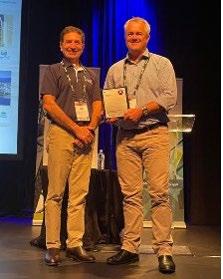
2 minute read
Professional Registration: Highlighting Best Practice
Scott Britton, Director Policy & Partnerships, IPWEAQ
We live in a large, geographically disperse state where attraction and retention of suitably qualified public works professionals is a significant ongoing challenge. Given these challenges and thinking about professional registration specifically, what role do organisations employing engineers play?
In recent months, discussions surrounding registered engineers working in local government have become a daily occurrence for IPWEAQ. Whether it be state government departments, councils, the Board of Professional Engineers of Queensland (BPEQ), other peak bodies, or even our members, the Crime and Corruption Commission’s (CCC) recent correspondence to council chief executive officers shone a light on what was otherwise a sleeping issue. The CCC’s views are clear. Council employees engaging in the delivery of professional services, as defined in the Professional Engineers Act 2002 (PE Act), while not registered, may amount to corrupt conduct under the Crime and Corruption Act 2001. The CCC’s actions have far-reaching implications across the broader public works sector. While there has been significant discussion surrounding registration and what constitutes supervision, the question of best practice from an organisational perspective is probably one that hasn’t had the attention it deserves. How organisations go about implementing a framework that supports the PE Act is an essential piece of a much broader picture. What does such a framework look like and are we talking about organisational structure and ongoing professional development? What is the consideration given to membership of professional bodies such as IPWEAQ? While there is probably no clearcut approach to this, the corporate policies of both the Department of Transport and Main Roads (TMR) and Toowoomba Regional Council (TRC) are exemplars to this end. Similarities between the TMR and TRC policies are worthy of being highlighted. Support for professional registration, membership of a professional body such as IPWEAQ, and ongoing professional development are common elements across these policies. However, the one thing that takes these policies to the next level is the stance on professional registration. Both TMR and TRC stipulate that those occupying positions at the senior engineer level or higher must be registered. While TRC prefers candidates are registered from the outset, the organisation allows a 12-month grace period for professional registration. TMR adopts a stronger, zero-tolerance stance on registration for those occupying senior engineer positions. To recognise the critical role that public works employers play in the advancement of our sector, IPWEAQ has launched two new awards as part of this year’s Excellence Awards program: Employer of the Year (Private Sector) and Employer of the Year (Public Sector). These new awards highlight best practice and initiatives that contribute to the advancement of the sector, of which engineering is just one of many disciplines.
Prof ess ional DEVELOPMENT
INFORMS. CONNECTS. REPRESENTS. LEADS.








